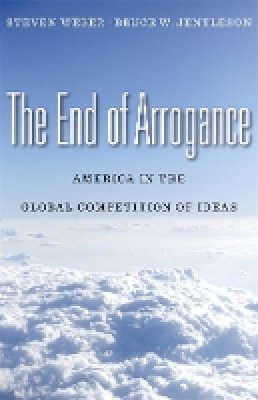
The End of Arrogance: America in the Global Competition of Ideas
Steven Weber
Free-market capitalism, hegemony, Western culture, peace, and democracy—the ideas that shaped world politics in the twentieth century and underpinned American foreign policy—have lost a good deal of their strength. Authority is now more contested and power more diffuse. Hegemony (benign or otherwise) is no longer a choice, not for the United States, for China, or for anyone else.
Steven Weber and Bruce Jentleson are not declinists, but they argue that the United States must take a different stance toward the rest of the world in this, the twenty-first century. Now that we can’t dominate others, we must rely on strategy, making trade-offs and focusing our efforts. And they do not mean military strategy, such as “the global war on terror.” Rather, we must compete in the global marketplace of ideas—with state-directed capitalism, with charismatic authoritarian leaders, with jihadism. In politics, ideas and influence are now critical currency.
At the core of our efforts must be a new conception of the world order based on mutuality, and of a just society that inspires and embraces people around the world.
Product Details
About Steven Weber
Reviews for The End of Arrogance: America in the Global Competition of Ideas
G. John Ikenberry
Foreign Affairs
The End of Arrogance makes a strong case for the end of the hegemony of American ideas in the foreign-policy sphere, examines what a more complex and diverse set of influences could create in terms of a future world order, and offers some important advice on how America can keep up in a more competitive world.
Elizabeth Dickinson
Foreign Policy blog
Dazzling.
Ronald Brownstein
National Journal
Weber and Jentleson put forward a powerful and provocative view of the coming frontiers for foreign policy—a global competition of ideas. Their arguments pose the right challenge to governments, corporations, and NGOs operating on a global stage, and provide practical advice for what to do about it.
Janice Stein, Director, Munk School of Global Affairs, University of Toronto
